Transforming your deck into a vibrant garden oasis has never been easier with the right plant selection and container arrangements. Whether you have a sprawling outdoor space or a compact balcony, incorporating plants creates a natural retreat that enhances both beauty and functionality. Modern deck gardening offers endless possibilities through strategic plant placement, from privacy screening to aromatic herb collections that bring fresh flavors to your kitchen. The key lies in understanding your space limitations, sun exposure, and maintenance preferences while selecting plants that thrive in container environments. Smart planning allows you to maximize vertical space, create year-round interest, and establish outdoor rooms that reflect your personal style while providing the perfect backdrop for relaxation and entertainment.
1. Container Garden Groupings for Decks
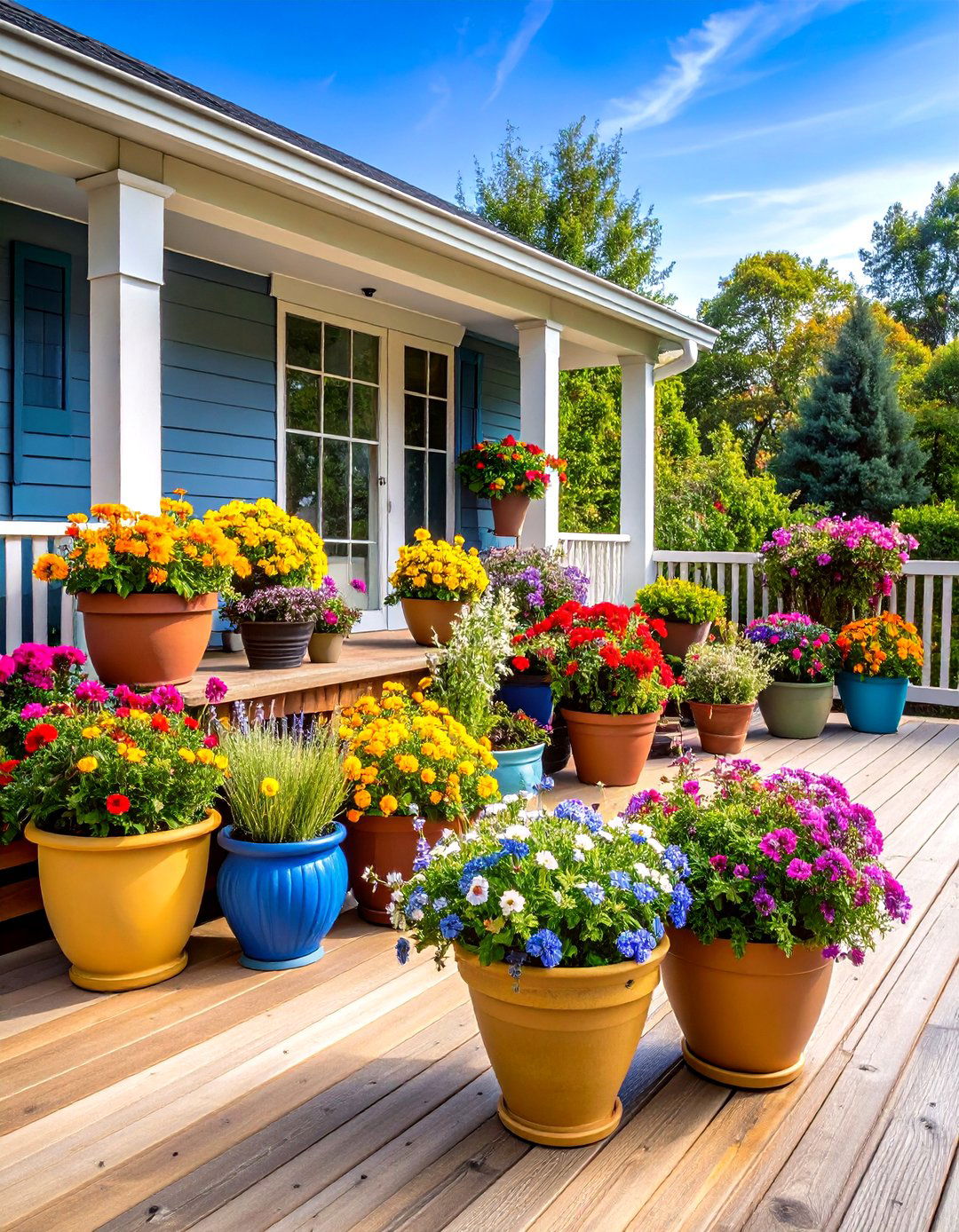
Are you ready to create stunning focal points that draw the eye across your outdoor space? Grouping containers of varying sizes creates dynamic visual interest while maximizing plant diversity in compact areas. Start with large containers as anchor points, then surround them with medium and small pots filled with complementary plants. Mix flowering annuals like petunias and marigolds with trailing varieties such as sweet potato vine for cascading effects. Choose containers in coordinating colors or materials to maintain cohesion while allowing plant varieties to shine. This layered approach transforms plain deck corners into vibrant garden displays that evolve throughout growing seasons.
2. Vertical Wall Planters for Small Deck Spaces

What if you could grow fifty plants in just four square feet of deck space? Vertical gardening revolutionizes small deck decorating by utilizing wall space for maximum plant impact. Wall-mounted planters, pocket gardens, and tiered systems allow herbs, succulents, and trailing flowers to cascade downward while preserving precious floor space. Install sturdy mounting systems that can support water weight, then fill compartments with lightweight potting mix. Layer different textures and colors from top to bottom, placing sun-loving plants higher and shade-tolerant varieties lower. This living wall approach creates dramatic backdrops while providing easy access for harvesting herbs and deadheading flowers throughout the growing season.
3. Railing Planter Boxes for Privacy

Could your deck railing double as a productive garden space while creating natural privacy? Railing planters transform ordinary deck perimeters into lush green boundaries that screen unwanted views. Install custom-fitted boxes or adjustable planters that hook securely over rails, then fill with tall grasses, evergreen shrubs, or flowering plants that provide seasonal interest. Dwarf conifers offer year-round privacy, while ornamental grasses sway gracefully in breezes. Include trailing elements like ivy or petunias that spill over edges for softened lines. Strategic spacing between planters maintains air circulation while creating natural sight barriers that feel integrated rather than imposed on your outdoor living space.
4. Hanging Basket Displays for Overhead Interest
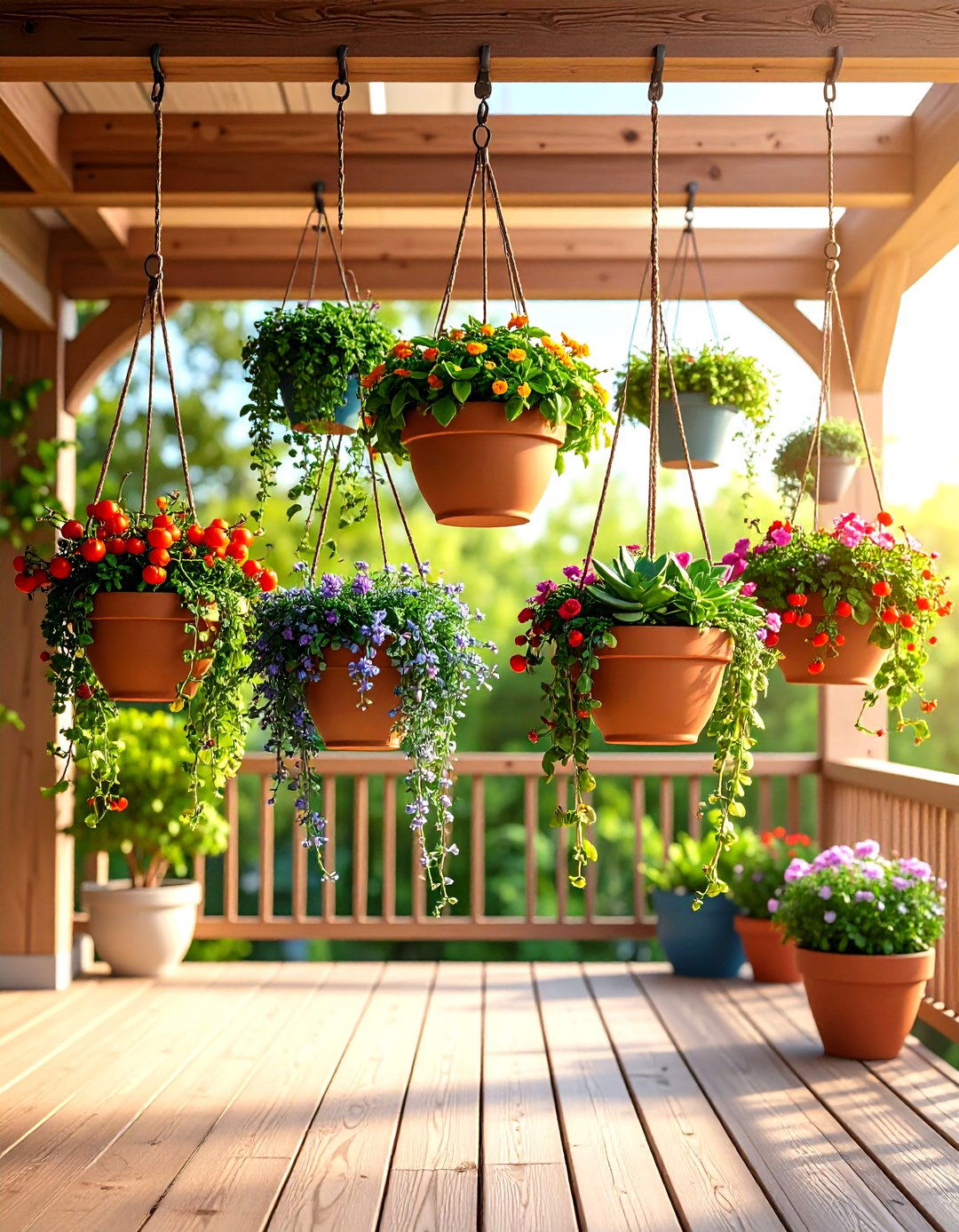
Why limit your gardening to ground level when overhead space offers unlimited potential? Hanging baskets suspended from pergolas, awnings, or ceiling hooks create layered garden displays that add dimension to flat deck surfaces. Choose baskets with moisture-retaining liners to prevent water damage to deck surfaces below. Fill with trailing succulents, cascading flowers, or compact vegetables like cherry tomatoes and strawberries. Vary heights and plant selections to create visual rhythm while ensuring adequate spacing for plant growth and air circulation. This elevated approach maximizes growing space while creating intimate, enclosed feelings that transform decks into garden rooms with natural ceilings.
5. Tropical Paradise Setup for Warm Climate Decks

How can you recreate vacation vibes in your own backyard? Tropical plants in large containers instantly transform decks into exotic retreats that transport you to warmer destinations. Focus on bold foliage plants like elephant ears, bird of paradise, and palm varieties that thrive in containers during warm months. Group plants with varying leaf shapes and sizes to create jungle-like density while maintaining clear pathways. Include flowering tropicals like hibiscus and bougainvillea for vibrant color accents. Large, stable containers prevent toppling while providing adequate root space for vigorous growth. This dramatic approach works especially well on sunny decks with protection from strong winds that might damage delicate tropical foliage.
6. Succulent Arrangements for Low-Maintenance Beauty
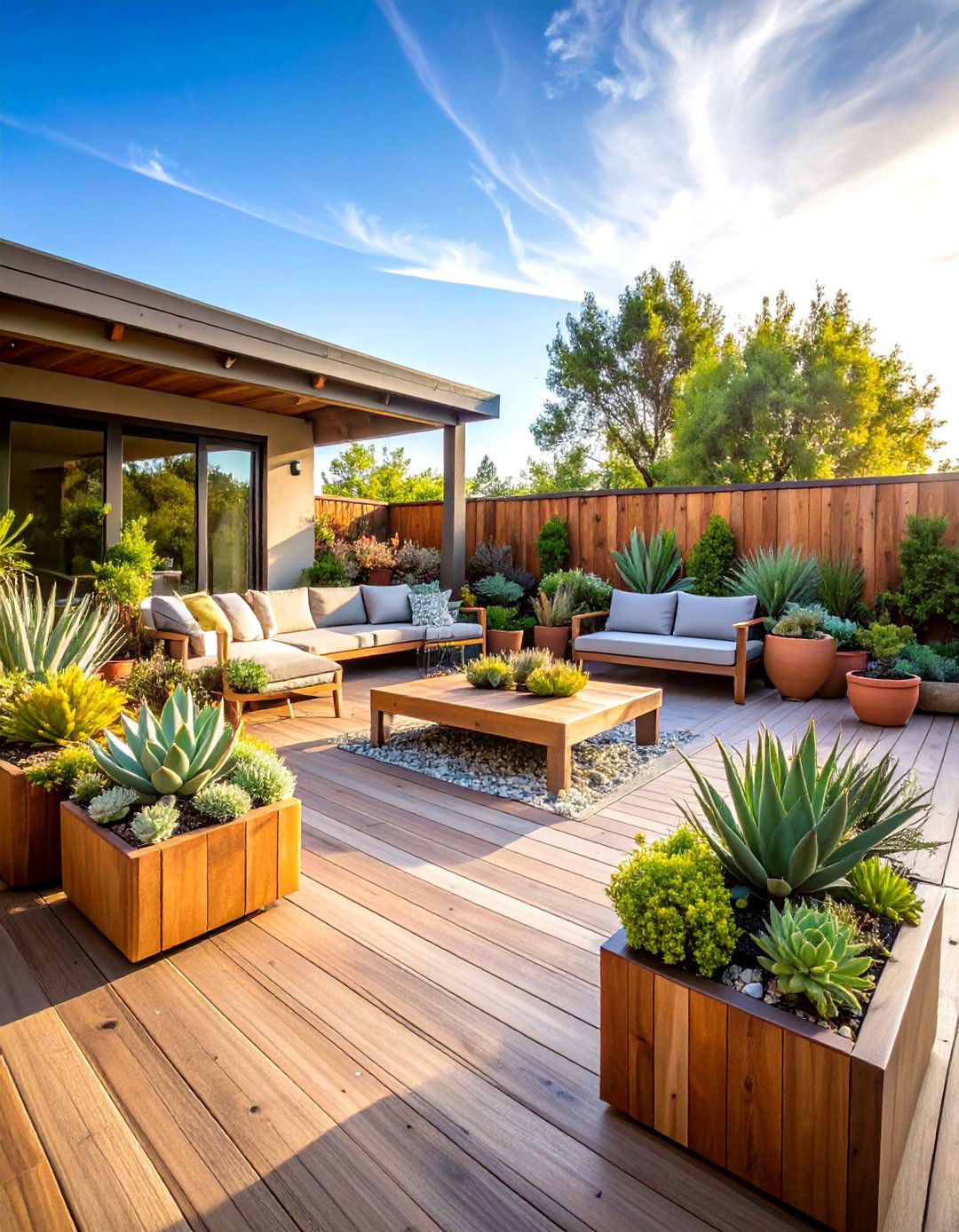
Are you seeking gorgeous garden displays that forgive forgotten watering schedules? Succulent arrangements offer striking architectural forms with minimal care requirements, perfect for busy lifestyles or drought-prone regions. Combine different varieties like echeveria, sedum, and jade plants in shallow, wide containers that showcase their sculptural qualities. Arrange by height and color, placing spiky varieties like agave as focal points surrounded by rosette-forming succulents. Use decorative mulch like colored stones or bark to define planted areas while reducing moisture loss. This drought-tolerant approach creates sophisticated displays that evolve slowly, maintaining their appeal throughout seasons while requiring only occasional watering and virtually no other maintenance tasks.
7. Herb Garden Rails for Culinary Convenience

What could be more satisfying than harvesting fresh herbs just steps from your kitchen? Railing herb gardens place culinary essentials within easy reach while maximizing limited deck space through vertical growing. Install narrow planters along rails, then plant frequently used herbs like basil, oregano, rosemary, and thyme in separate compartments for easy identification and harvesting. Include cascading varieties like trailing rosemary or creeping thyme that soften planter edges. Group plants by water and sun requirements to simplify care routines. This functional approach ensures fresh ingredients for cooking while creating aromatic barriers that enhance outdoor dining experiences and naturally repel insects that might interfere with deck relaxation and entertainment.
8. Privacy Screening Plants for Secluded Deck Areas
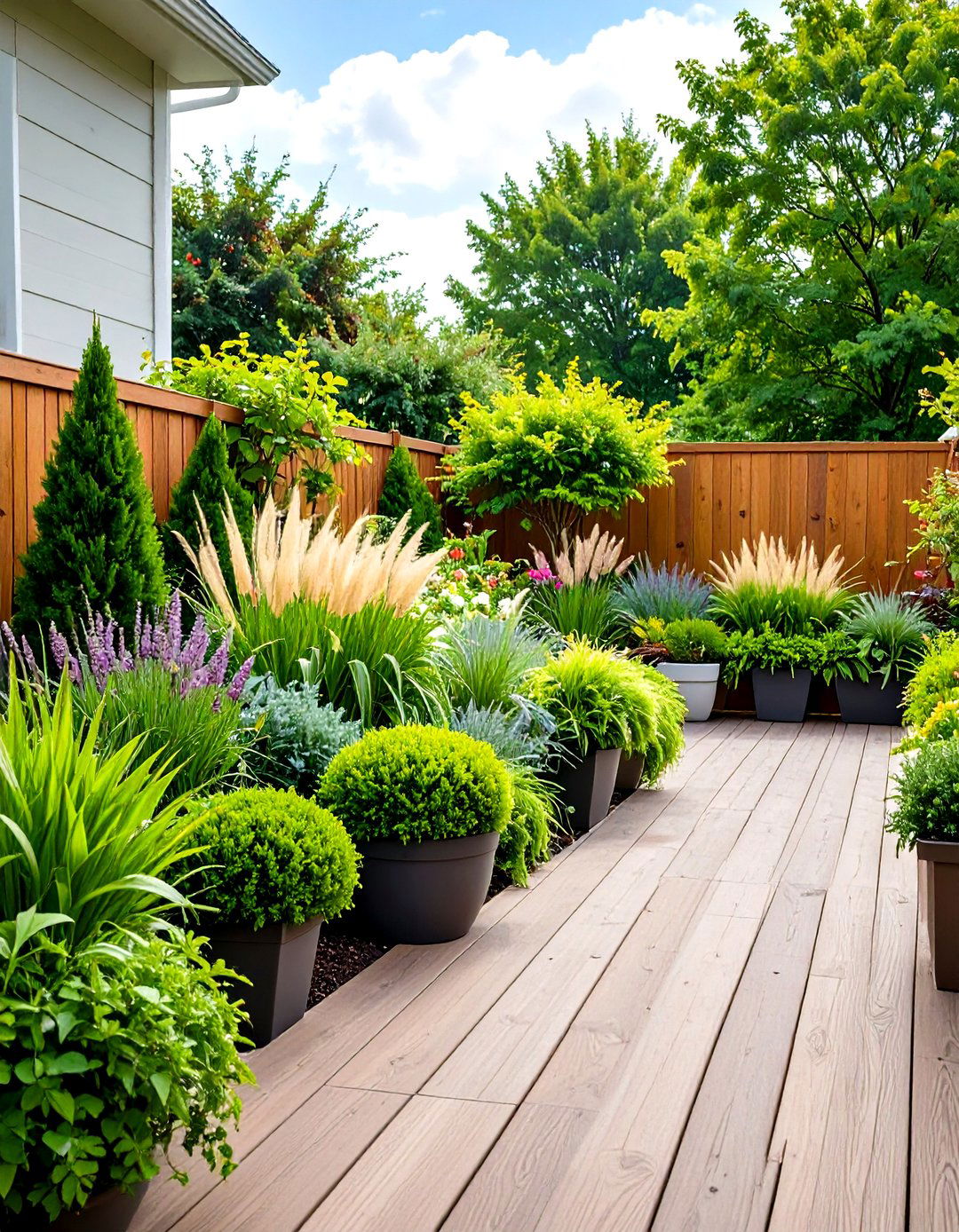
Could strategic plant placement create intimate outdoor rooms without expensive fence construction? Privacy screening plants in containers offer flexible solutions for blocking unwanted views while maintaining airflow and natural lighting. Position large containers filled with evergreen shrubs like boxwood or arborvitae at strategic points around deck perimeters. Supplement with tall ornamental grasses that provide seasonal movement and texture changes. Include flowering shrubs for added interest without sacrificing screening effectiveness. This living barrier approach adapts to changing privacy needs while creating natural boundaries that feel less imposing than solid structures, allowing gradual adjustments as plants mature and requirements evolve throughout different seasons and entertaining needs.
9. Butterfly Garden Containers for Wildlife Attraction
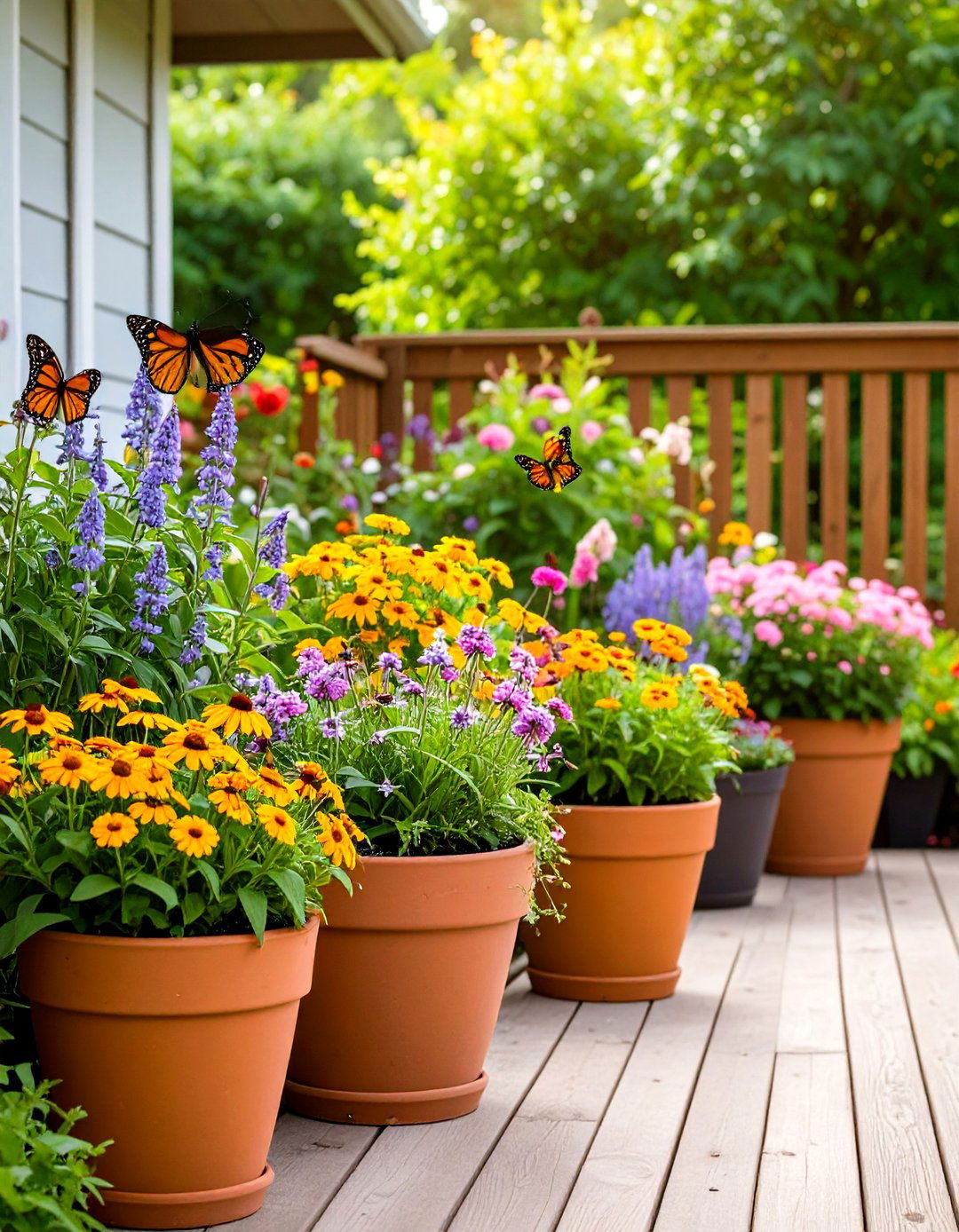
Why not invite nature's most beautiful pollinators to visit your deck regularly? Butterfly garden containers filled with nectar-rich flowers create magical outdoor spaces that support local ecosystems while providing endless entertainment. Plant butterfly favorites like zinnia, verbena, and butterfly bush in large containers that accommodate their spreading growth habits. Include host plants like milkweed for monarch caterpillars alongside nectar sources for adult butterflies. Group plantings to create sufficient mass for attracting butterfly attention while maintaining clear sight lines for observation. This wildlife-friendly approach transforms decks into active ecosystems that change throughout seasons, offering educational opportunities for children while supporting declining pollinator populations through thoughtful plant selection and strategic container placement.
10. Seasonal Color Themes for Year-Round Interest
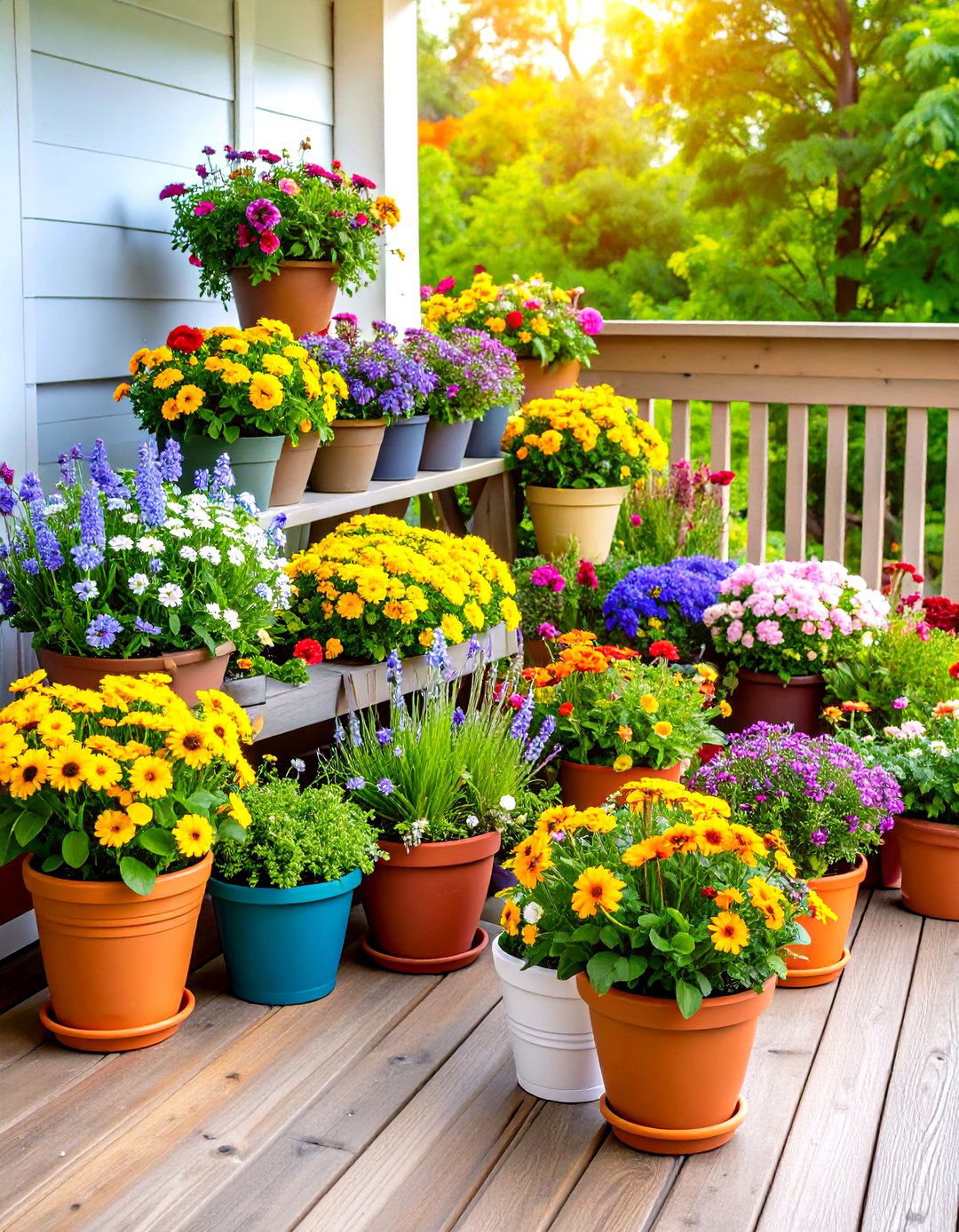
How can you ensure your deck remains vibrant and welcoming throughout changing seasons? Seasonal color themes using interchangeable container plantings maintain visual interest while adapting to climate variations and personal preferences. Plan spring displays with cool-season annuals like pansies and primrose, then transition to heat-loving summer flowers like marigolds and sunflowers. Include autumn arrangements featuring ornamental kale, chrysanthemums, and seasonal gourds for harvest appeal. Winter interest comes from evergreen arrangements supplemented with holiday decorations. This rotating approach keeps deck displays fresh and seasonally appropriate while allowing experimentation with different color combinations and plant varieties that reflect changing moods and occasions throughout the year.
11. Low-Maintenance Succulents for Busy Gardeners

What if you could create stunning garden displays that practically care for themselves? Low-maintenance succulent gardens thrive with minimal intervention while providing architectural interest and unique textures that evolve slowly over time. Select drought-tolerant varieties like aloe, jade plants, and hens-and-chicks that store water in thick leaves and stems. Arrange in well-draining containers using cactus soil mix supplemented with decorative stones for improved drainage and visual appeal. Group plants with similar water requirements to simplify care routines while creating cohesive displays. This stress-free approach allows even novice gardeners to achieve professional-looking results that remain attractive throughout seasons while requiring only occasional watering and minimal maintenance beyond removing spent flower stalks.
12. Climbing Vine Screens for Natural Boundaries

Could fast-growing vines create living walls that provide both beauty and functionality? Climbing vine screens using trellises or pergola supports offer quick-establishing privacy solutions while adding vertical growing space for productive or ornamental plants. Train flowering vines like clematis, morning glories, or sweet peas up sturdy supports for seasonal color displays. Include evergreen options like star jasmine or English ivy for year-round coverage in suitable climates. Combine different vine varieties for extended bloom periods and diverse textures that create dynamic visual interest. This vertical approach maximizes limited deck space while providing natural air conditioning through transpiration and shade creation that makes outdoor areas more comfortable during hot weather periods.
13. Tiered Planter Stands for Maximum Growing Space
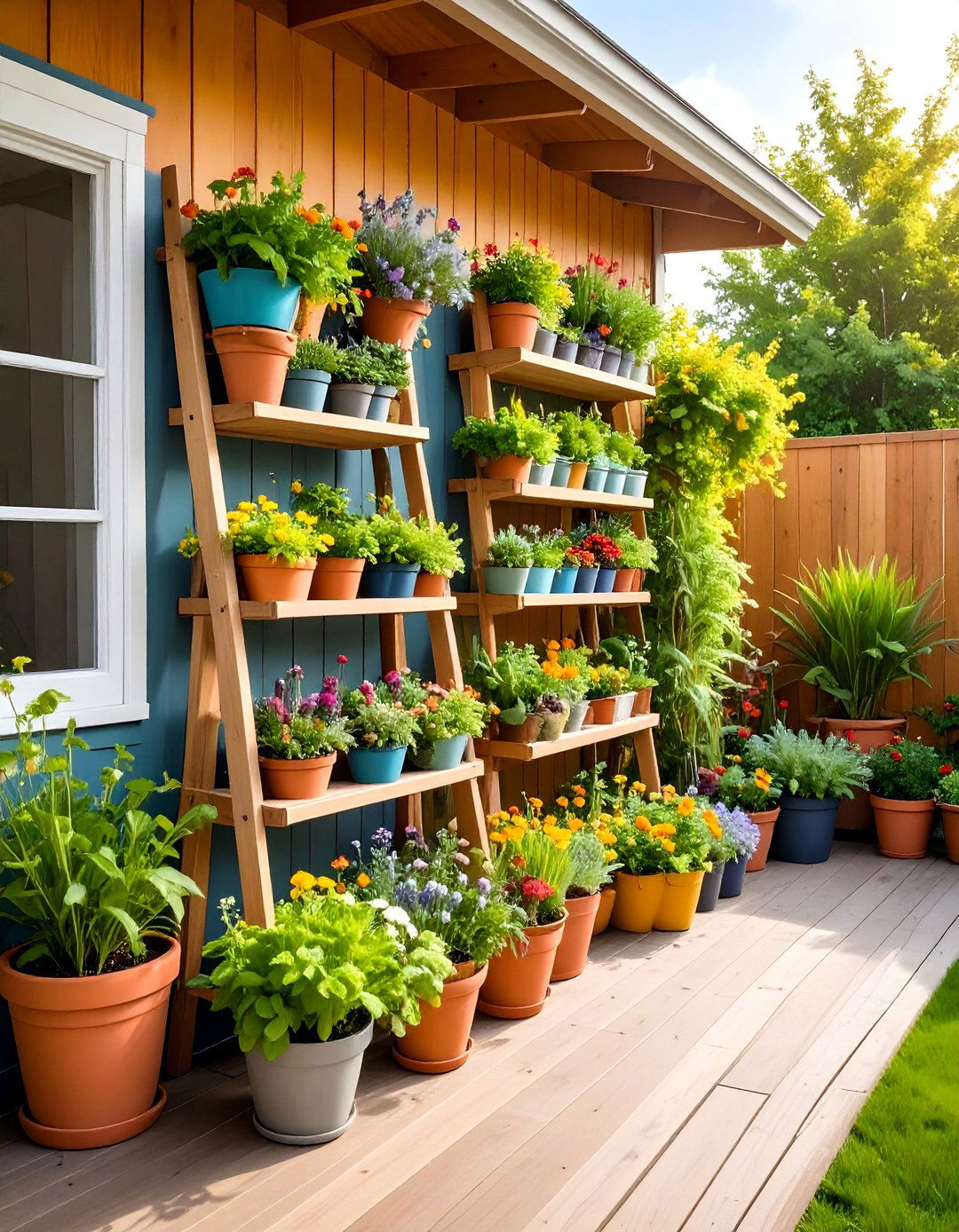
Are you struggling to fit all your favorite plants within limited deck dimensions? Tiered planter stands create multi-level growing systems that accommodate numerous plants while maintaining organized, accessible arrangements. Use plant stands, repurposed ladders, or custom-built staging to create vertical growing surfaces that allow adequate light penetration to lower levels. Arrange plants by size and light requirements, placing taller specimens on lower tiers and cascading plants on upper levels. Include wheels or casters for seasonal repositioning and winter storage flexibility. This space-efficient approach multiplies growing capacity while creating dramatic displays that serve as living sculptures, transforming deck corners into productive garden centers that maximize both beauty and functionality.
14. Window Box Gardens for Deck Railings
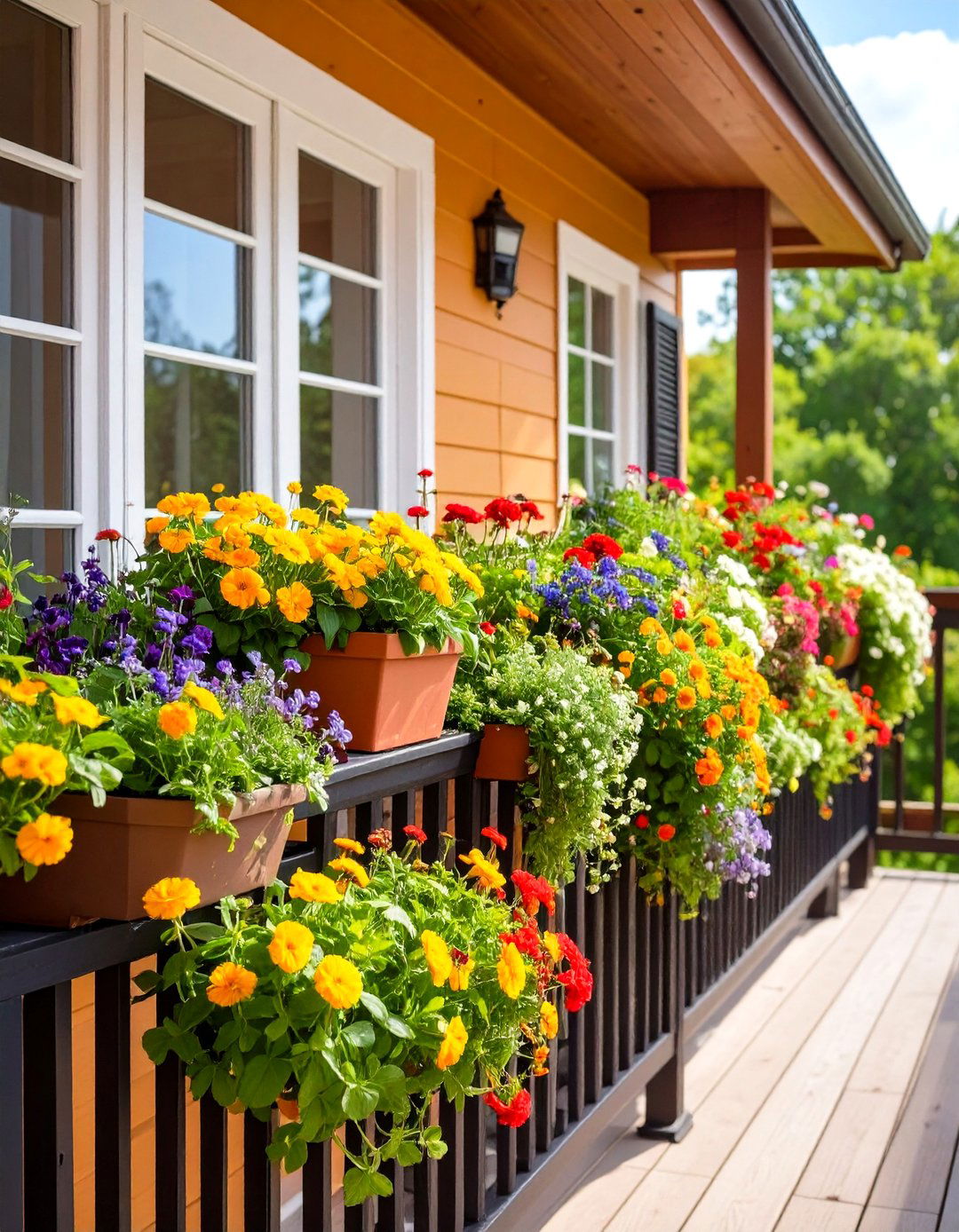
What simple addition could instantly transform your deck's appearance while adding functional growing space? Window box gardens mounted on deck railings create charming displays reminiscent of European balconies while maximizing available planting area. Install sturdy brackets that distribute weight evenly, then plant with seasonal flowers, herbs, or compact vegetables that provide ongoing interest. Choose plantings that complement your home's architectural style while considering mature sizes to prevent overcrowding. Include trailing elements that soften box edges and create cascading effects. This classic approach adds cottage garden charm while keeping plants at comfortable heights for maintenance and harvesting, creating picturesque displays that enhance both deck aesthetics and property curb appeal.
15. Mixed Texture Displays for Visual Contrast

How can you create sophisticated plant arrangements that capture attention and provide year-round visual appeal? Mixed texture displays combine plants with contrasting foliage shapes, sizes, and surface qualities to create dynamic compositions that remain interesting even without flowers. Pair broad-leafed hostas with spiky ornamental grasses, smooth succulents with fuzzy lamb's ear, or glossy-leafed evergreens with delicate ferns. Vary container materials and colors to complement plant textures while maintaining overall design cohesion. This artistic approach relies on architectural plant qualities rather than fleeting bloom periods, ensuring consistent beauty throughout growing seasons while developing gardening skills in recognizing and combining different plant characteristics that create sophisticated, professional-looking displays.
16. Dwarf Tree Containers for Vertical Impact
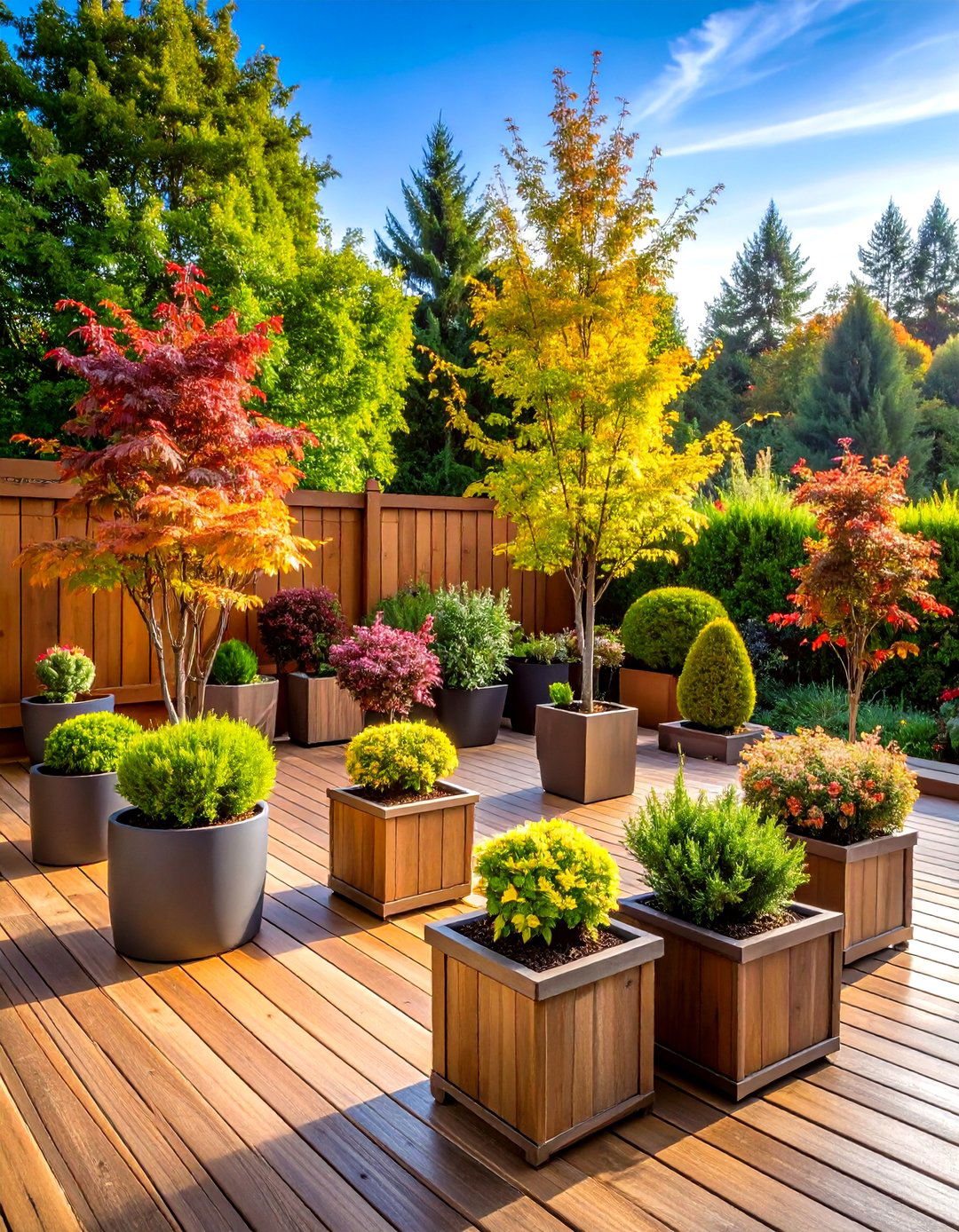
Why settle for small plants when dwarf trees can provide substantial presence in container settings? Dwarf tree containers create instant maturity and vertical interest while remaining manageable in size for deck environments. Select varieties like dwarf fruit trees, Japanese maples, or compact conifers that adapt well to container culture and provide multi-season interest through flowers, fruit, or foliage changes. Use large, stable containers that accommodate root systems while preventing toppling in wind conditions. Position strategically to create focal points, frame views, or provide partial shade for seating areas. This substantial approach brings woodland feeling to deck spaces while providing long-term value and seasonal changes that mark time passage in garden cycles.
17. Desert Garden Theme for Water-Wise Landscapes

Could you create exotic garden displays while conserving water resources and reducing maintenance demands? Desert garden themes using cacti, agaves, and other xerophytic plants offer striking architectural forms with minimal water requirements. Arrange spiky specimens like barrel cacti with rosette-forming agaves and trailing succulent varieties for diverse textures and forms. Use decorative gravel mulch and terra cotta containers to reinforce desert aesthetics while improving drainage. Include drought-tolerant flowering plants like lantana or desert marigold for seasonal color accents. This water-wise approach creates unique displays that thrive in hot, sunny deck locations while requiring minimal irrigation, making them ideal for water-restricted areas or vacation properties where consistent care might be challenging.
18. Cottage Garden Style for Romantic Deck Atmosphere

What garden style evokes feelings of romance and timeless beauty while adapting perfectly to container culture? Cottage garden style arrangements combine informal plant mixtures with vintage containers to create charming, slightly wild displays that feel established and welcoming. Mix flowering annuals and perennials with herbs and small vegetables in weathered pots or repurposed containers for authentic charm. Include traditional cottage plants like roses, lavender, and sweet alyssum alongside modern varieties that provide extended bloom periods. Allow some plants to self-seed and create natural groupings that enhance the informal aesthetic. This nostalgic approach creates welcoming outdoor spaces that feel connected to gardening traditions while adapting historical styles to contemporary deck living requirements.
19. Modern Minimalist Plants for Contemporary Decks

How can you achieve striking visual impact using fewer plants and cleaner design principles? Modern minimalist plant arrangements focus on architectural plant forms, geometric containers, and restrained color palettes that complement contemporary home designs. Select plants with strong structural qualities like snake plants, modern grasses, or sculptural succulents arranged in sleek containers with clean lines. Emphasize negative space and plant placement precision rather than abundance or variety. Use monochromatic color schemes or single accent colors for sophisticated restraint. This contemporary approach creates calm, uncluttered outdoor spaces that serve as natural extensions of modern interior design while requiring minimal maintenance to preserve their clean, intentional appearance throughout growing seasons.
20. Shade Garden Containers for Covered Deck Areas

What plants thrive in dim deck areas that receive limited direct sunlight throughout the day? Shade garden containers filled with low-light plants transform covered decks and north-facing spaces into lush retreats using foliage plants and shade-tolerant flowers. Focus on plants with interesting leaf shapes and colors like coleus, caladiums, and begonias that provide visual interest without requiring full sun exposure. Include ferns and hostas for classical shade garden appeal alongside modern varieties that offer extended season interest. Use light-colored containers to brighten shaded areas while grouping plants with similar moisture requirements for simplified care routines. This adaptive approach ensures even challenged deck locations can support thriving plant displays.
21. Edible Deck Gardens for Fresh Food Production
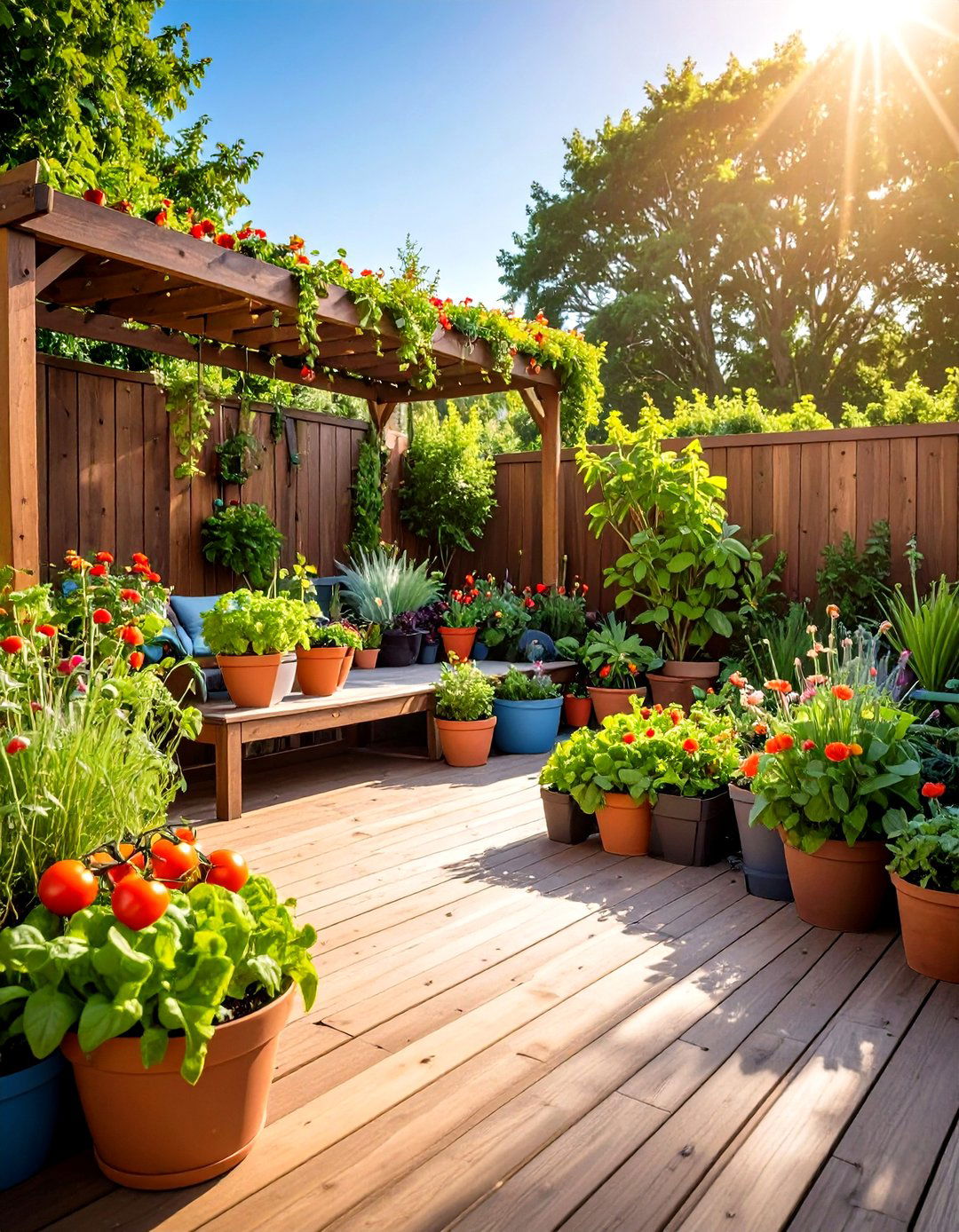
Could your deck provide fresh vegetables and herbs while maintaining ornamental appeal throughout growing seasons? Edible deck gardens combine productive plants with attractive containers to create functional displays that feed both body and soul. Grow compact vegetables like cherry tomatoes, peppers, and lettuce in decorative pots that complement deck aesthetics. Include culinary herbs that provide both seasoning ingredients and aromatic qualities that enhance outdoor dining experiences. Train climbing vegetables like beans or cucumbers on attractive trellises for vertical food production. This practical approach transforms deck spaces into productive landscapes that provide fresh ingredients while creating attractive displays that prove vegetable gardening can be both beautiful and bountiful in limited spaces.
22. Fragrant Plant Collections for Sensory Garden Experiences

Why limit garden enjoyment to visual appeal when aromatic plants can create multi-sensory outdoor experiences? Fragrant plant collections strategically placed near seating areas enhance relaxation while providing natural aromatherapy benefits. Include classic fragrant flowers like gardenias, sweet alyssum, and nicotiana alongside aromatic herbs like rosemary, lavender, and mint that release scents when brushed against. Position containers where foot traffic or breezes naturally distribute fragrances without overwhelming sensitive noses. Consider bloom timing to ensure continuous fragrance throughout growing seasons. This sensory approach creates memorable outdoor spaces that engage multiple senses while providing natural stress relief and enhanced enjoyment of deck areas during both day and evening entertainment activities.
23. Compact Vegetable Gardens for Small Space Food Production
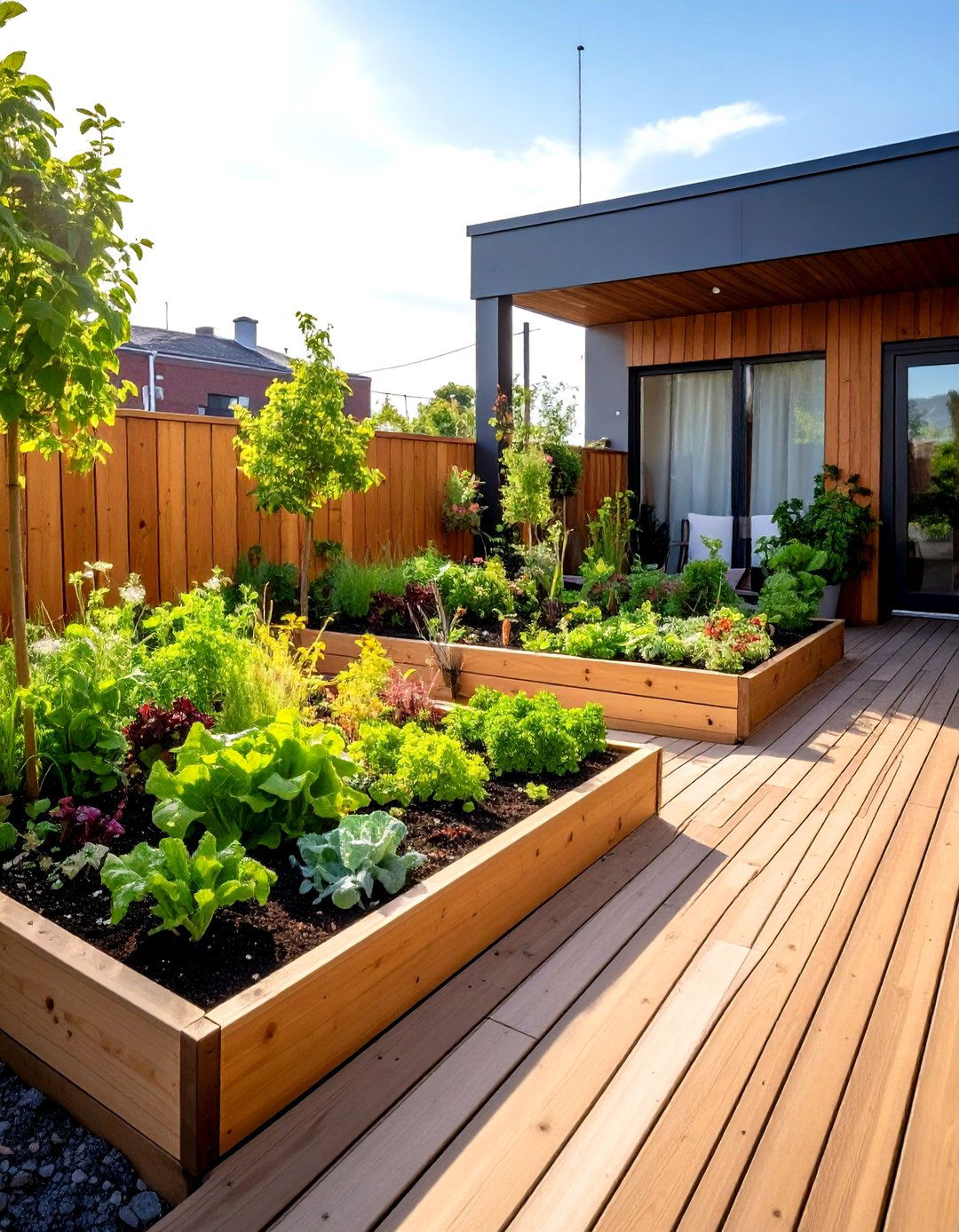
How can you grow meaningful amounts of fresh vegetables within typical deck space limitations? Compact vegetable gardens using space-efficient varieties and intensive growing techniques maximize food production while maintaining attractive appearances. Select bush-type vegetables, dwarf varieties, and vertical-growing crops that provide high yields relative to space requirements. Use succession planting techniques to extend harvest periods while rotating crops to maintain soil health in containers. Include companion plantings that improve growth while providing natural pest control benefits. This productive approach demonstrates that meaningful food production is possible even in small spaces while creating attractive displays that blend seamlessly with ornamental plantings to provide both beauty and sustenance throughout growing seasons.
24. Year-Round Evergreen Display for Constant Color
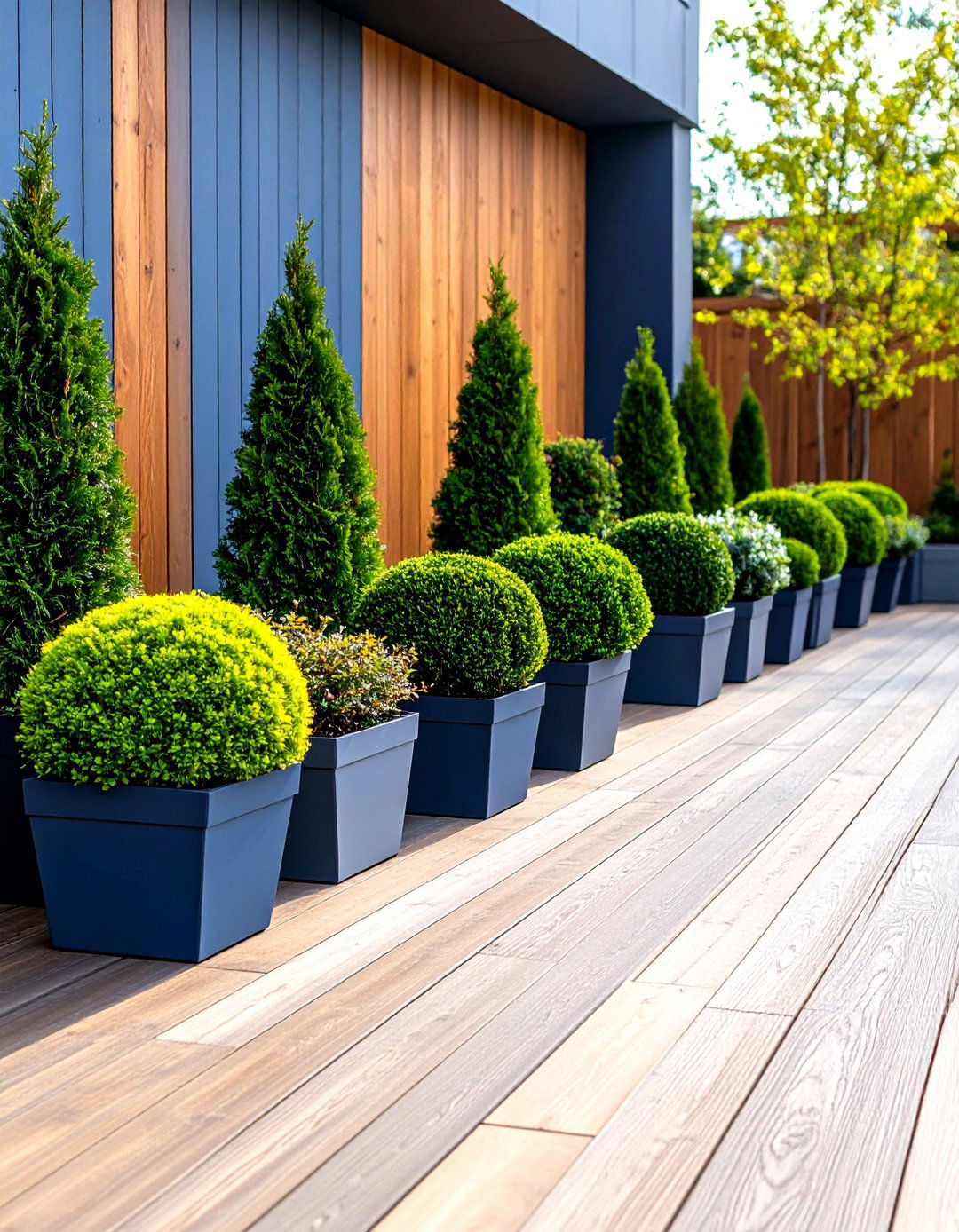
What plants ensure your deck remains attractive and welcoming even during dormant winter months? Year-round evergreen displays using conifers, broadleaf evergreens, and winter-interesting plants maintain structure and color throughout seasons when most plants enter dormancy. Select evergreen shrubs with varying textures and colors like boxwood, holly, and dwarf spruce arranged in attractive containers that withstand temperature fluctuations. Include plants with interesting bark, berries, or architectural forms that provide winter interest beyond simple green foliage. Supplement with seasonal decorations during holidays while maintaining plant-based foundation that requires minimal seasonal changes. This enduring approach ensures deck areas remain inviting and attractive throughout year-round cycles while reducing seasonal maintenance demands and providing consistent beauty.
Conclusion:
Creating beautiful deck spaces with plants opens endless possibilities for transforming ordinary outdoor areas into extraordinary garden retreats. Whether you prefer low-maintenance succulents, productive herb gardens, or dramatic tropical displays, strategic plant selection and thoughtful container placement can accommodate any lifestyle and aesthetic preference. The key lies in understanding your specific conditions, maintenance capabilities, and design goals while selecting plants that thrive in container environments. By incorporating various growing techniques from vertical gardens to railing planters, even the smallest deck can support diverse plant collections that provide year-round beauty, fresh food, and natural privacy. These 24 ideas demonstrate that successful deck gardening combines creativity with practical considerations to create outdoor spaces that enhance both property value and daily living experiences.


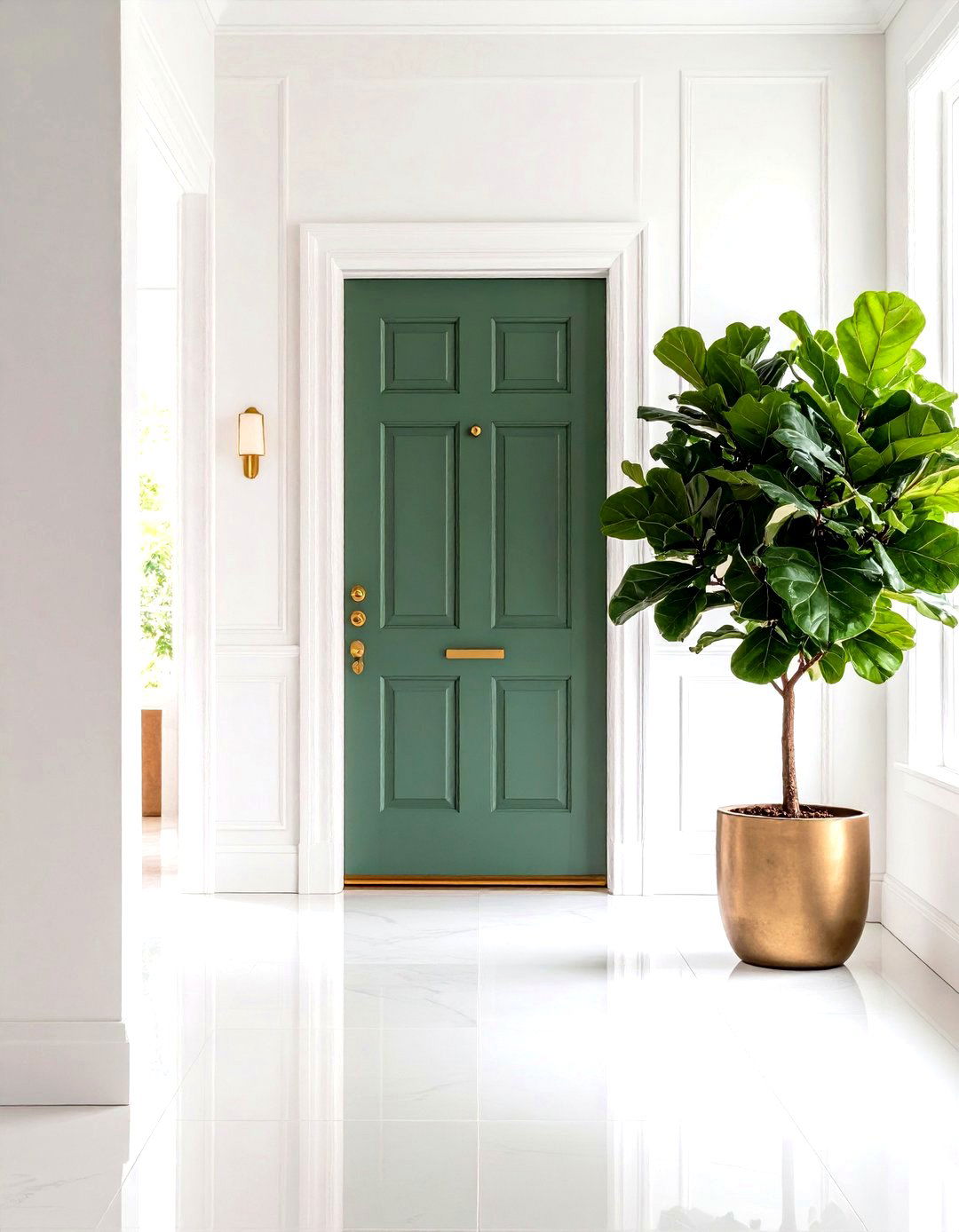
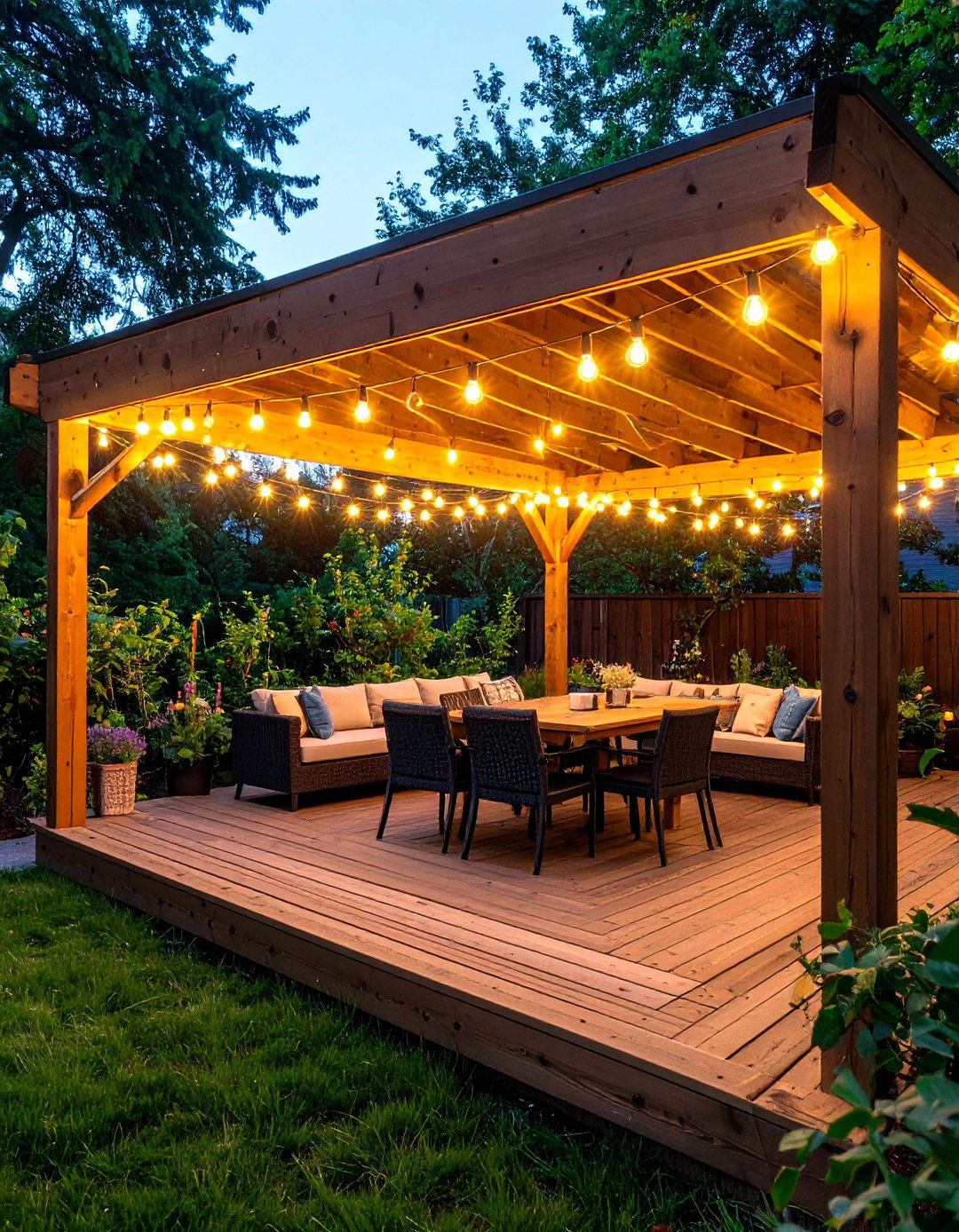

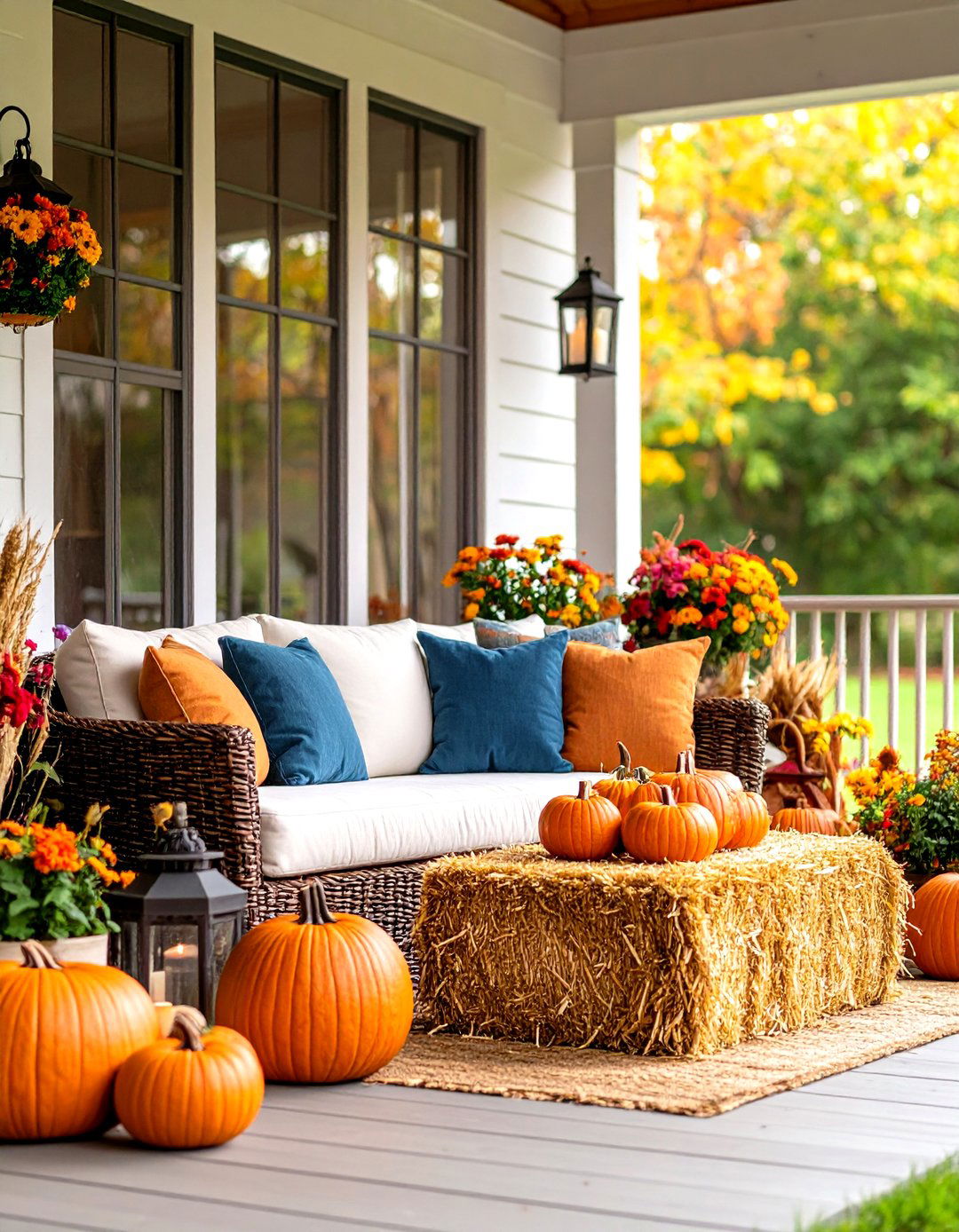


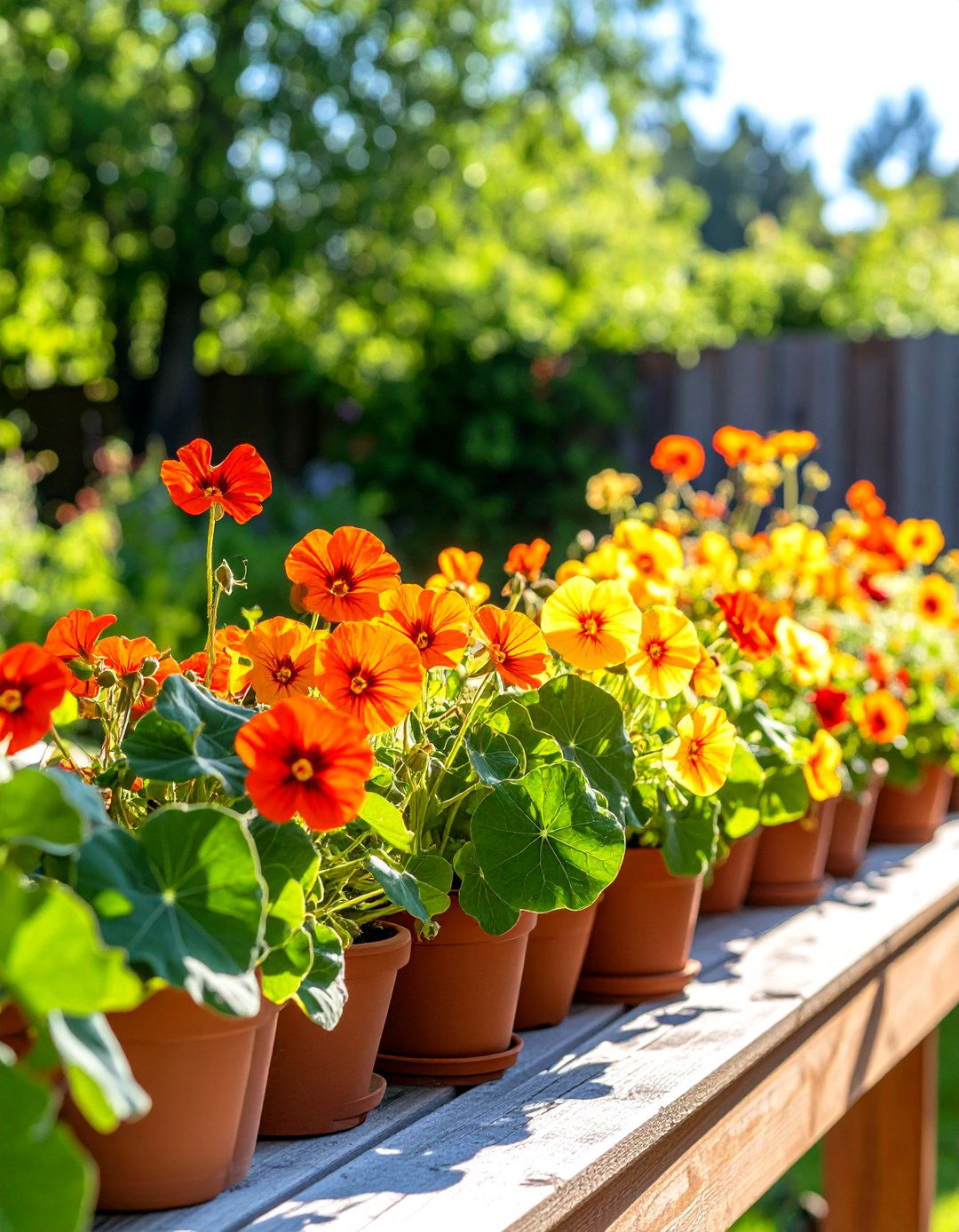
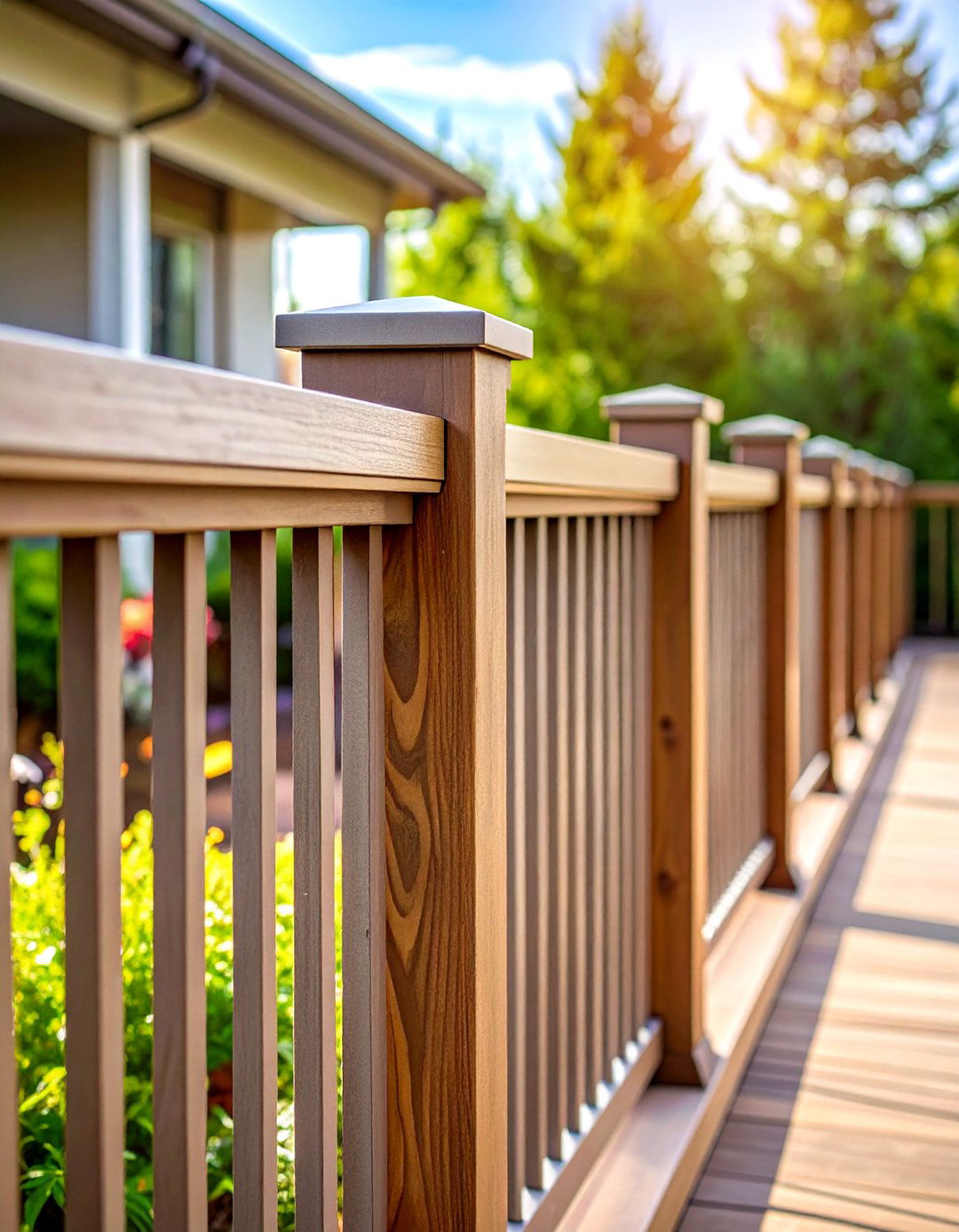
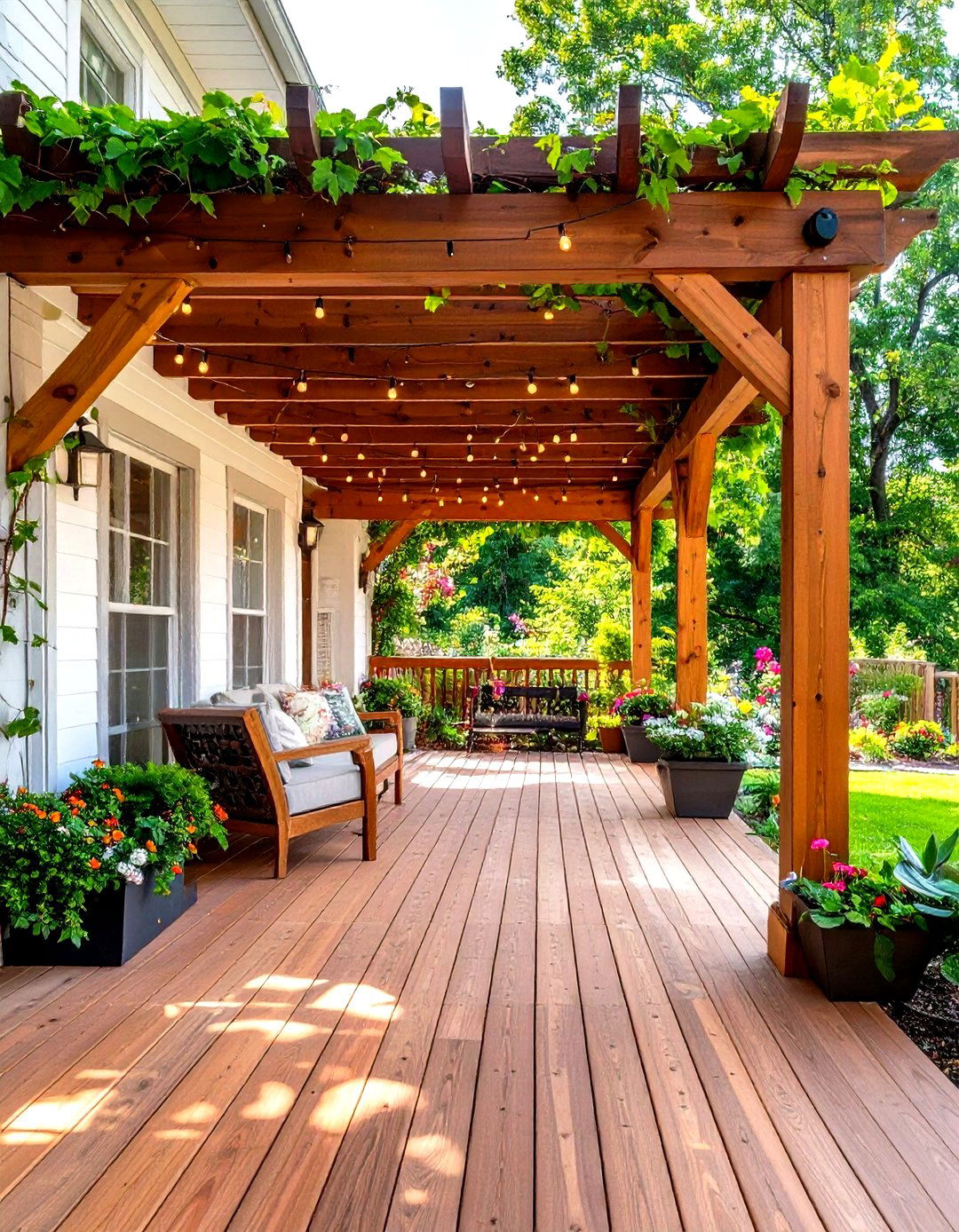
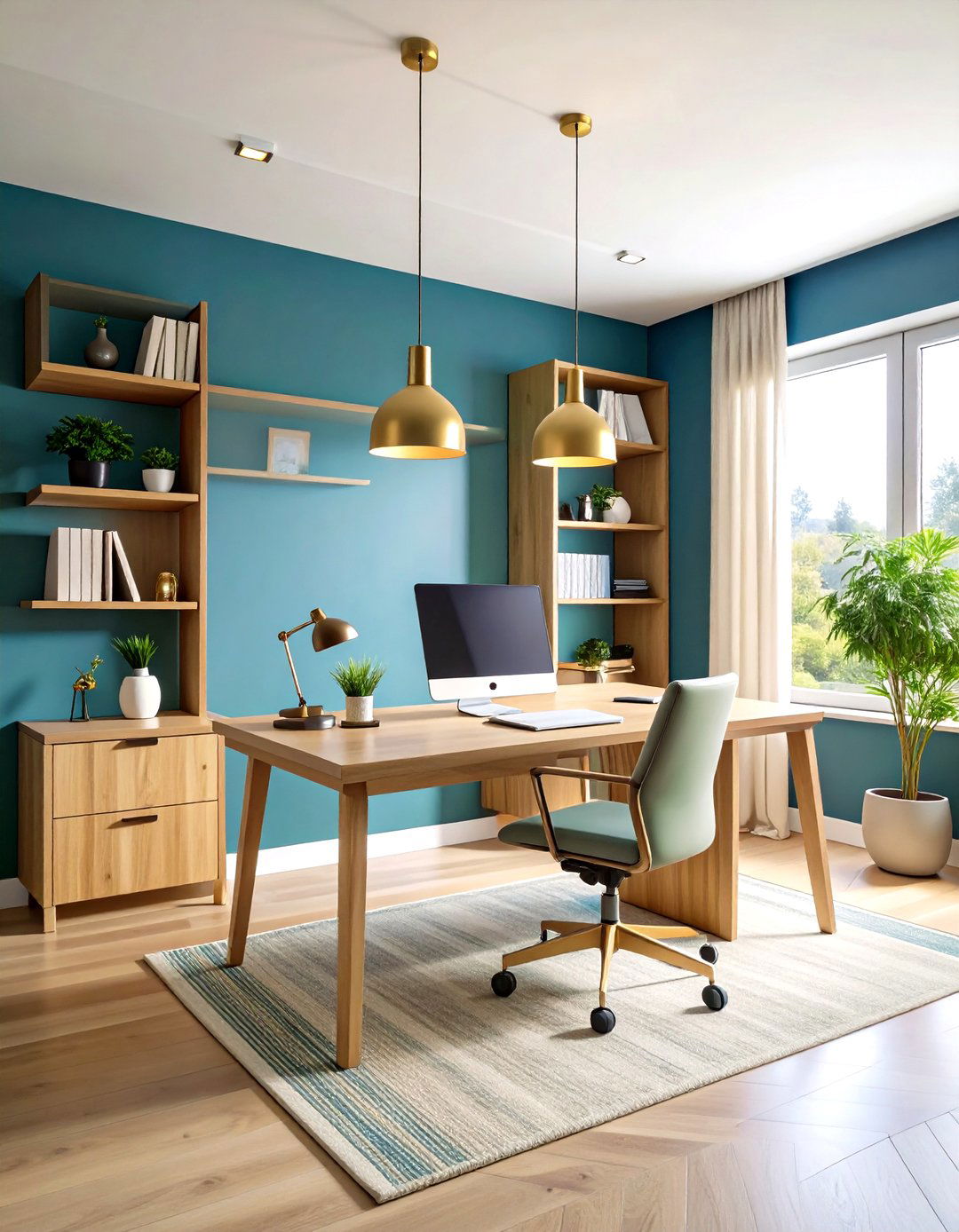
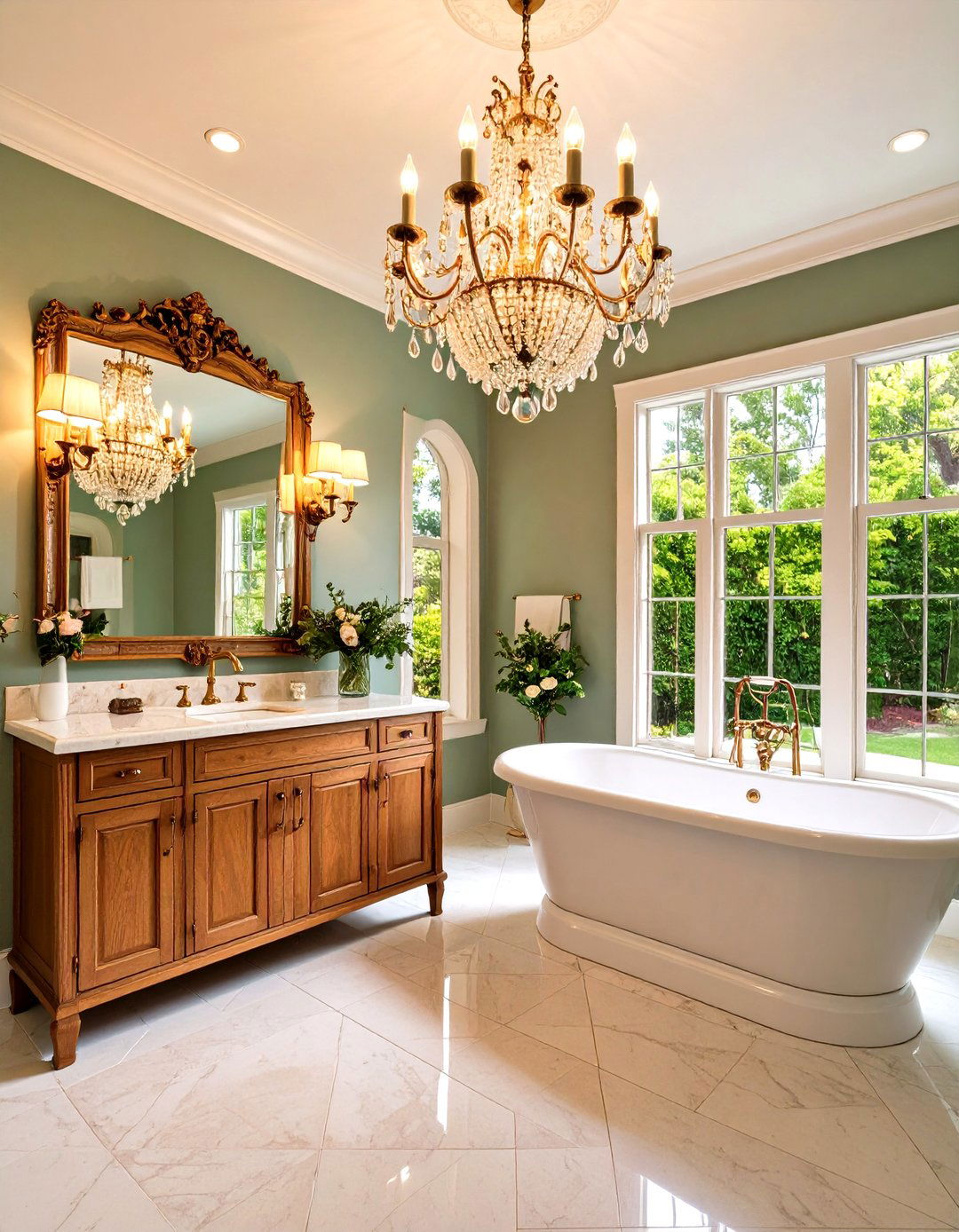

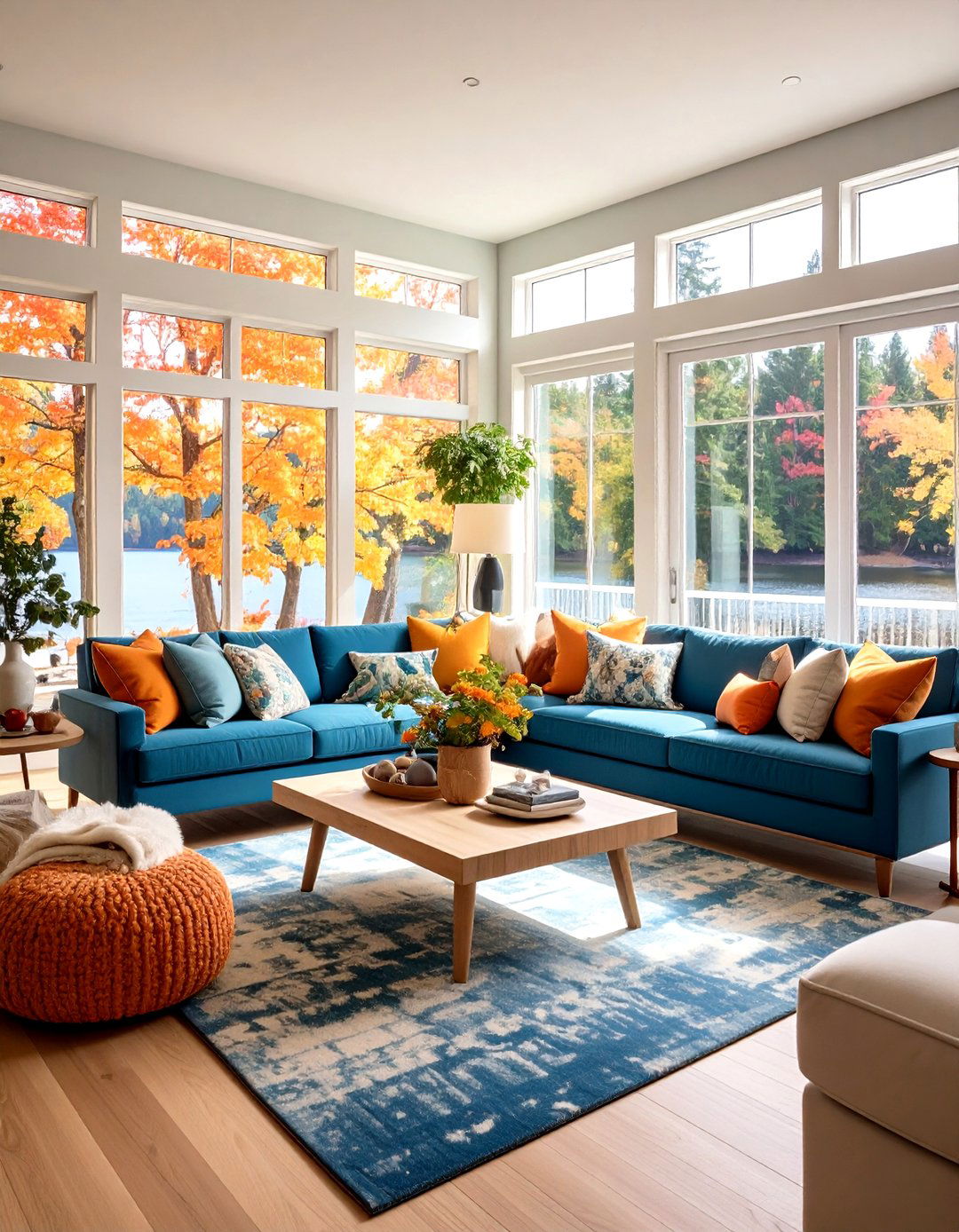
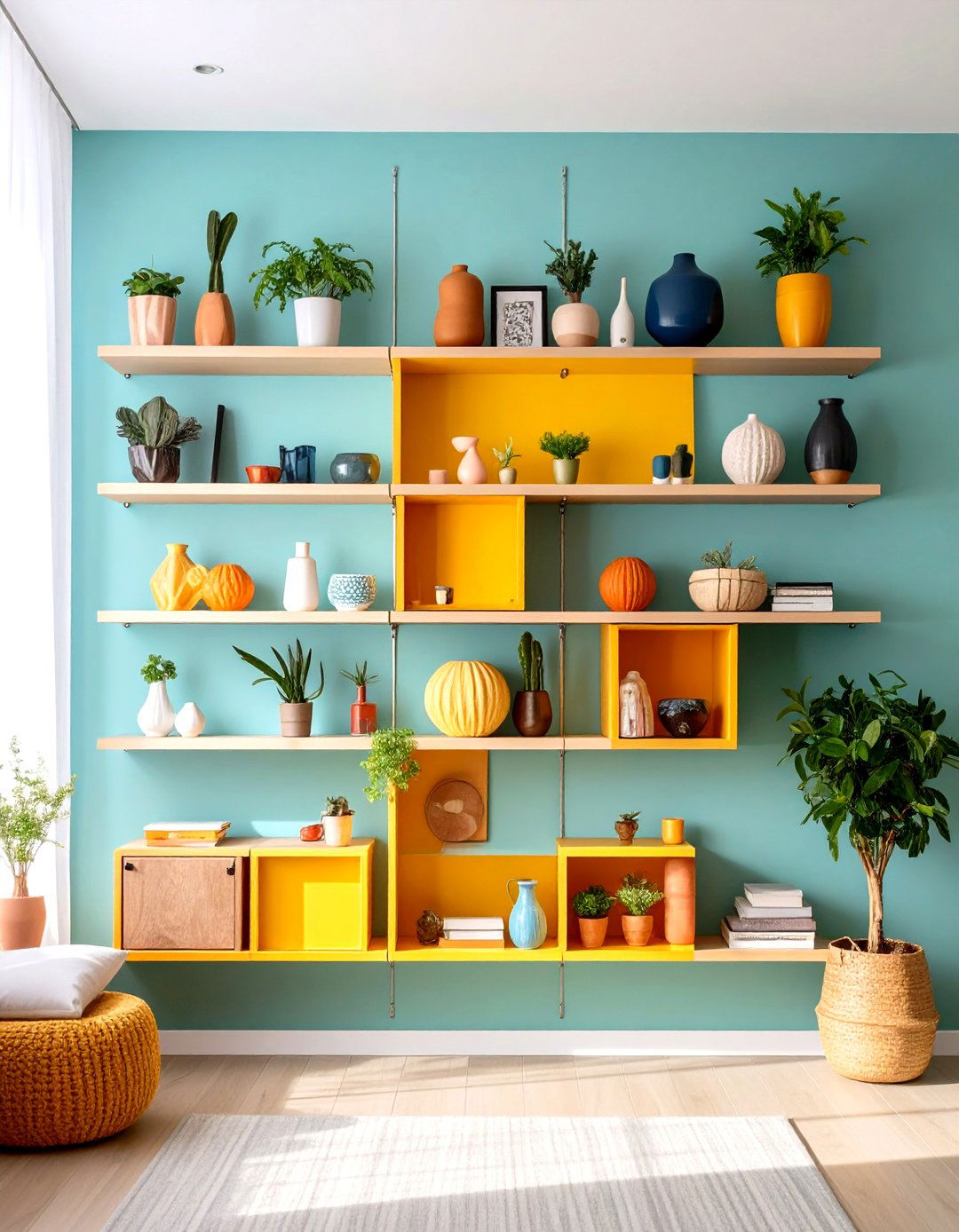
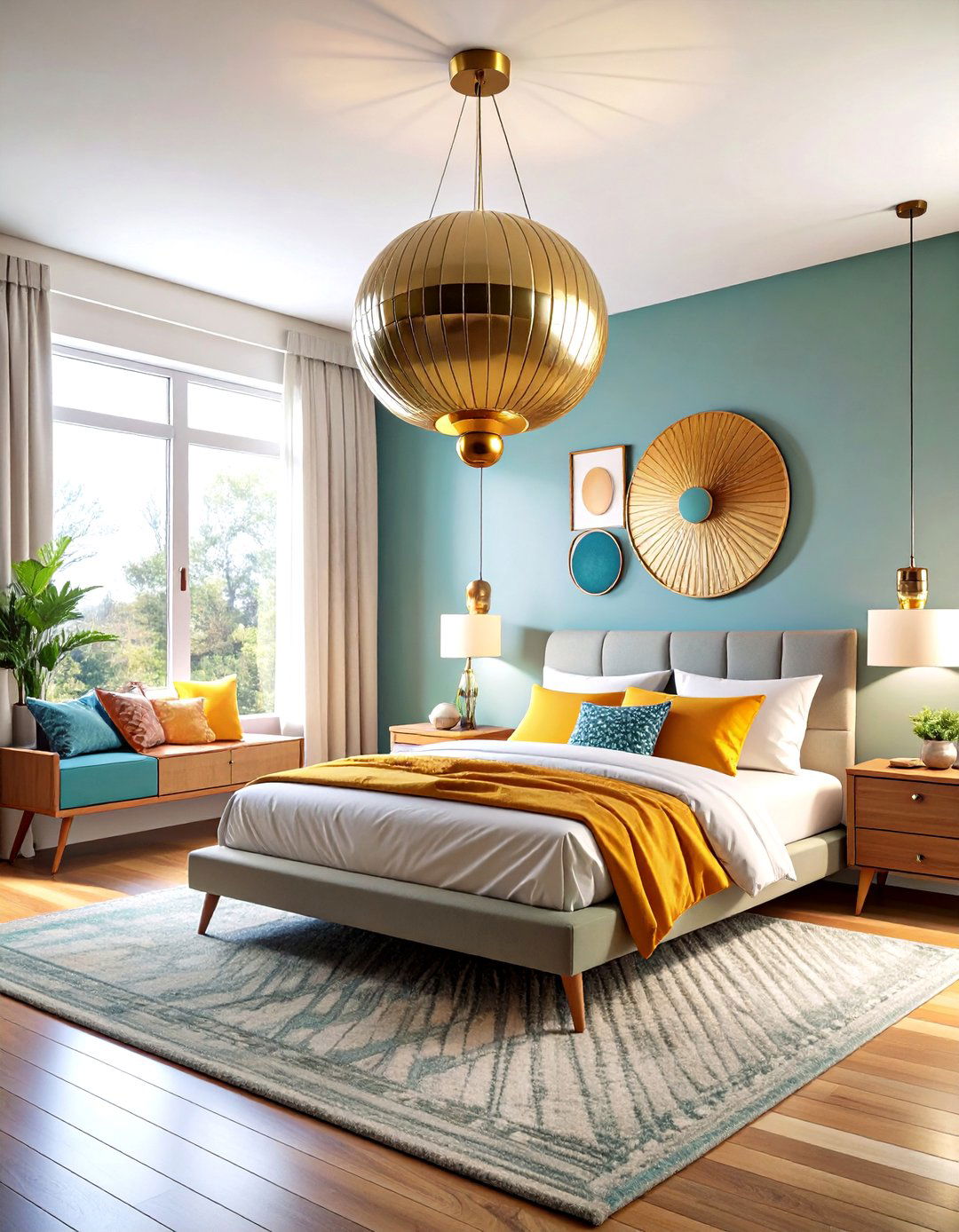
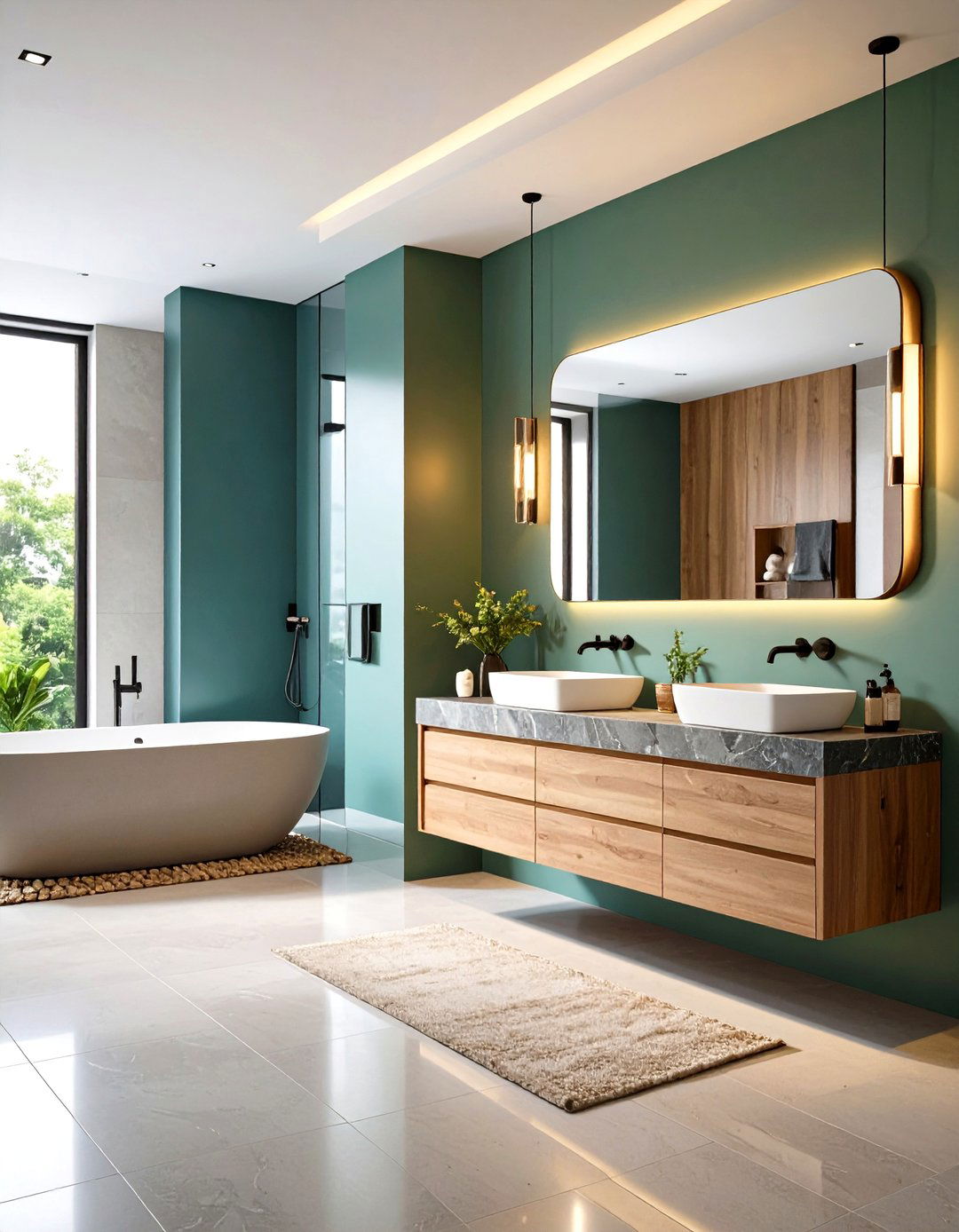
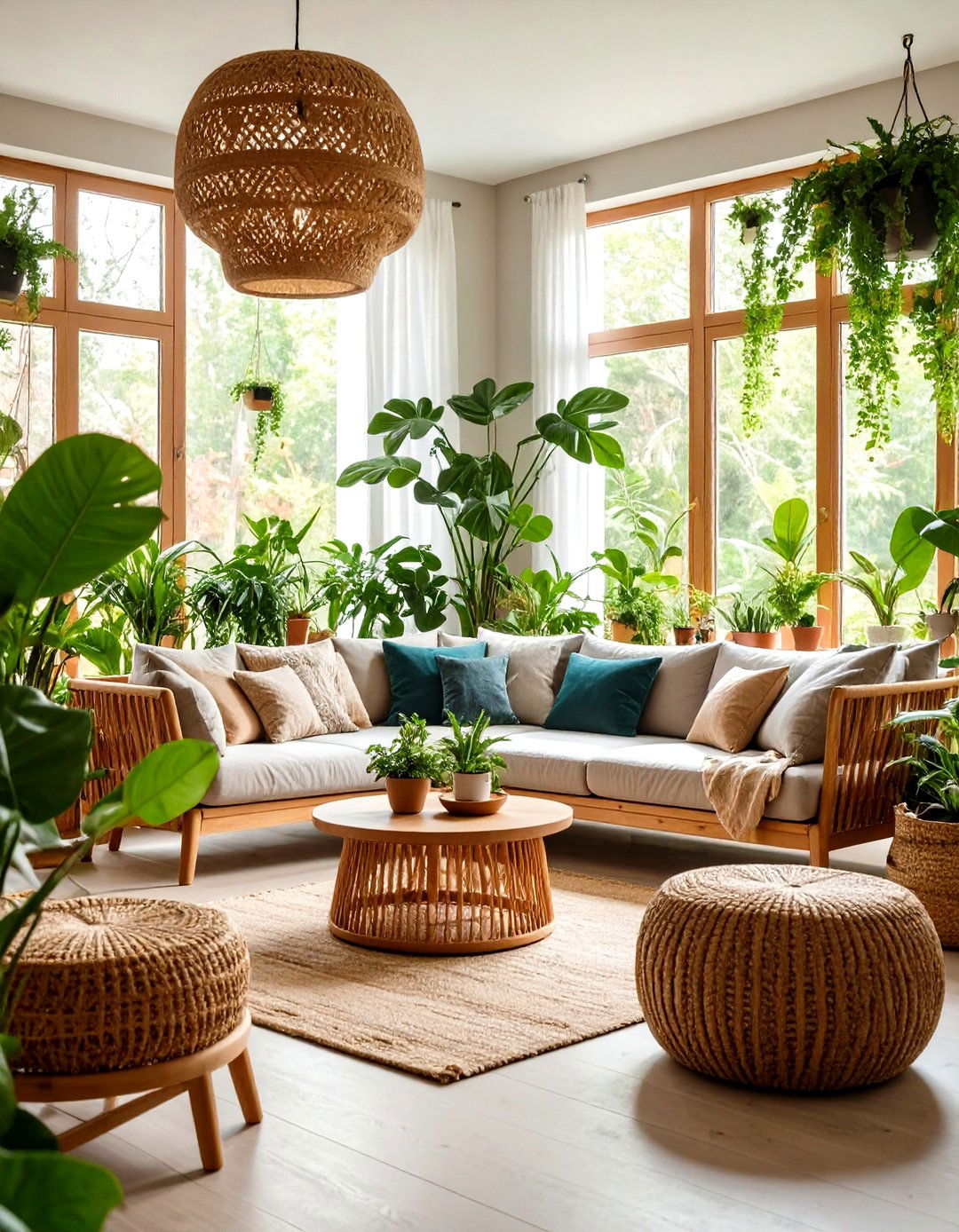

Leave a Reply